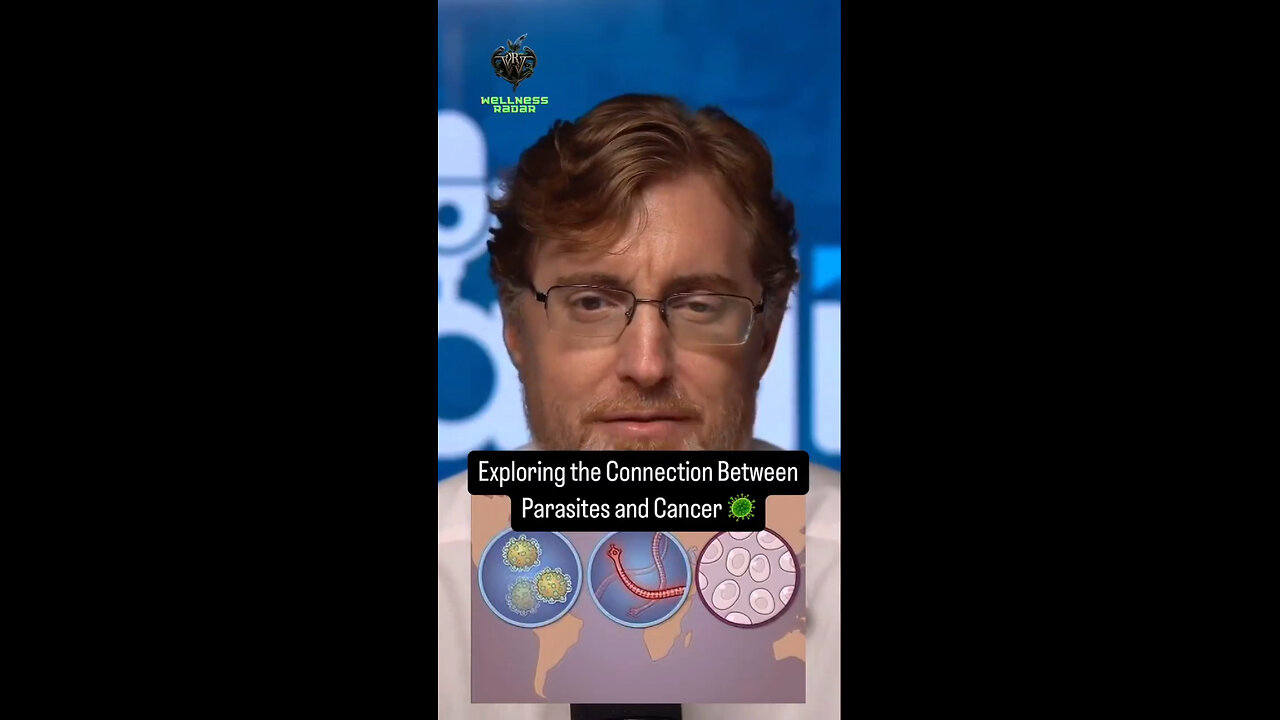Premium Only Content

Rethinking Cancer: The Overlooked Roles of Parasites and Venom
Recent theories suggest a compelling reexamination of cancer’s origins, focusing on parasites and venom. Both present radical alternatives to the conventional view of cancer as simply a result of genetic mutation or environmental exposure. Here’s a deeper look at these theories, the science behind them, and how they could reshape our understanding of diagnosis and treatment.
The Parasite-Cancer Connection: A Misdiagnosis?
Parasitic infections, often overlooked in conventional Western medicine, could play a much larger role in cancer diagnoses than previously acknowledged. Parasitic cysts and egg sacs are occasionally mistaken for tumors due to their appearance on imaging scans, especially in cases involving masses in organs like the liver, thyroid, or reproductive system. Parasitic infections cause chronic inflammation and immune reactions, conditions that can foster environments conducive to cancer growth. Inflammatory cells in infected tissue release growth factors, feeding both parasites and abnormal cells. Over time, persistent inflammation can trigger DNA mutations and accelerate abnormal cell division.
While parasites like Toxoplasma gondii, known to inhabit brain tissue and cause inflammation, have been linked to behavioral changes, their association with tumor-like growths is underexplored. With parasites known to infiltrate various body tissues, rethinking cysts and nodules as potentially parasitic rather than exclusively cancerous could open up new diagnostic protocols and treatments, prioritizing anti-parasitic medications and reducing unnecessary surgical interventions.
Venom and Cancer Growth: A Lesser-Known Link
Certain venom compounds, particularly those in snake venom, are known to accelerate cell division and trigger rapid growth, a phenomenon that may contribute to “turbo” cancer growth. Studies have shown that venom-derived proteins, when introduced to human cells, can disrupt cellular function, breaking down cell walls and causing unregulated proliferation. This type of rapid cellular disruption aligns with how venom works in nature, quickly paralyzing or incapacitating prey. Over time, exposure to such proteins could conceivably promote abnormal cell growth in humans.
Research dating back to the 1950s found that some venom compounds may indeed initiate or accelerate tumor formation. While venomous proteins are carefully studied for potential therapeutic uses—such as in pain management or blood pressure regulation—their darker potential as carcinogenic agents requires caution. Interestingly, some studies also suggest that nicotine, a plant alkaloid, may counteract the effects of venom-derived toxins. However, nicotine’s complex physiological impact raises ethical and practical concerns.
Knowledge Gaps in Medical Education
One challenge in addressing these alternative cancer theories is the limited focus on parasitology in Western medical education. In countries where parasitic infections are prevalent, medical professionals often consider parasites when diagnosing growths or nodules. However, in the United States, where medical curricula rarely emphasize parasitology, practitioners may overlook these infections, particularly in patients with no obvious exposure risks.
This gap could explain why parasitic infections are misinterpreted as tumors, leading to invasive procedures rather than targeted treatments. Incorporating parasitology more fully into medical training would enable doctors to recognize the signs of chronic parasitic infections and understand how these infections can create conditions that mimic, and even contribute to, cancer.
A Paradigm Shift in Cancer Treatment
If parasites and venom play substantial roles in cancer development, this could lead to new approaches in both prevention and treatment. Anti-parasitic medications or natural remedies, long used in certain cultures, could offer potential alternatives to more aggressive cancer treatments. Some plant compounds, like those in wormwood, have shown promise as anti-cancer agents due to their effectiveness against parasites, supporting the theory that certain cancers might respond to anti-parasitic protocols.
In cases where venom exposure is suspected, controlled applications of substances like nicotine could be explored further. However, these alternative methods require rigorous testing, ethical consideration, and an understanding of how compounds like nicotine work on a biochemical level. Ultimately, a better understanding of these overlooked cancer triggers may help create tailored treatments that address root causes more effectively.
Conclusion: A Broader Lens on Cancer Origins
The possibility that cancer could, in many cases, originate from parasites or venom highlights the importance of expanding our perspective on this complex disease. By incorporating parasitology and toxicology into cancer research and education, we may gain new insights into how cancer begins and evolves. This integrative approach has the potential to reshape cancer treatment, placing a greater emphasis on root causes and preventative care.
-
 0:58
0:58
FragmentsOfTruth
1 day agoThe Heliocentric Hoax: A Profound Exploration of Earth’s Shape and Its Impact on Humanity
1313 -
 19:41
19:41
Neil McCoy-Ward
7 hours agoFinally! Some Good News Today... (& Happy Thanksgiving!)
6.17K -
 LIVE
LIVE
tacetmort3m
8 hours ago🔴 LIVE - (HAPPY THANKSGIVING!) BACK WITH MORE STALKER ACTION - STALKER 2 - PART 7
114 watching -
 58:05
58:05
The Tom Renz Show
3 hours agoThanksgiving In America 2024 - With Mark Sherwood
3.84K1 -
 1:13:41
1:13:41
DDayCobra
5 hours ago $7.38 earnedHappy Thanksgiving!
34.4K2 -
 42:24
42:24
Professor Nez
5 hours ago🚨Kamala's Staff CONFESSES to FRAUD! Trump is Already MAKING AMERICA GREAT AGAIN! 🇺🇸
68K95 -
 5:12:17
5:12:17
Akademiks
8 hours agoDrake Sues Universal Music Group over Kendrick Lamar 'Not Like Us' again!! Diddy Denied Bail!
81.5K10 -
 1:23:15
1:23:15
Viss
6 hours ago🔴LIVE - Thanksgiving PUBG (Short Stream)
35.9K27 -
 22:56
22:56
Rethinking the Dollar
7 hours agoTrump, Crypto, and Chaos: Why Our Financial System is Facing Uncharted Territory
17.2K4 -
 2:47:46
2:47:46
TheSaf3Hav3n
19 hours ago| FORTNITE THANKSGIVING STREAM!! | WHAT ARE YOU THANKFUL FOR!!?) | #RumbleTakeOver
33.1K9